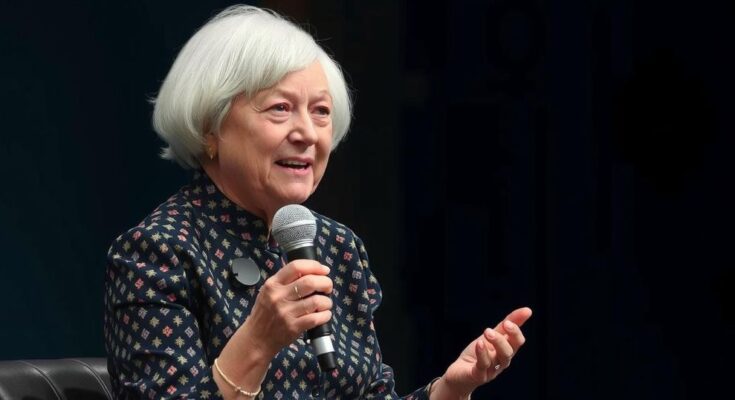Treasury Secretary Janet L. Yellen criticized China’s opaque lending practices in a recent interview, emphasizing the need for quicker debt relief for low and middle-income countries. Her comments came prior to the annual meetings of the IMF and World Bank, highlighting the burden of rising debts on these nations’ development initiatives amidst global economic challenges.
In a recent interview, Treasury Secretary Janet L. Yellen criticized the lack of transparency in China’s lending practices, urging international financial institutions and other creditors to hasten debt relief measures for low- and middle-income nations. This statement precedes the annual meetings of the International Monetary Fund (IMF) and the World Bank, which are convening in Washington amidst significant economic challenges. Although inflation rates have shown signs of easing, ongoing conflicts in the Middle East pose risks to energy markets. Meanwhile, elevated interest rates exert pressure on developing economies, hindering their ability to implement essential development projects against the backdrop of growing debt levels. Secretary Yellen articulated the gravity of the situation, stating that the burden of debt significantly limits investments in critical areas such as sustainable development, pandemic preparedness, and climate change initiatives. The IMF and the World Bank have faced criticism for their slow response to assisting struggling economies, as well as for necessitating economic reforms that often lead to public discontent and unrest. Yellen intends to acknowledge progress made by these multilateral institutions in her upcoming speech, notably improvements in lending capacity and expedited processes for project approvals, reflecting the Biden administration’s commitment to global economic support strategies. Nevertheless, the overarching issue of global debt remains a critical concern. The United States has been advocating for a comprehensive international debt relief initiative that extends beyond merely addressing the immediate needs of countries nearing default.
The call for debt relief in low- and middle-income countries has gained urgency as these nations face rising financial pressures exacerbated by high-interest rates and global economic instability. Transparency in international lending, specifically in relation to practices employed by countries such as China, has become a focal point for policymakers. This is particularly important as these nations grapple with significant debt loads that hinder their ability to invest in essential sectors necessary for sustainable growth and resilience against global challenges, such as climate change and pandemics. The role of the IMF and World Bank is critical as they are often the first lines of support for countries in financial distress, yet their strategies and responsiveness have come under scrutiny in light of recent economic crises.
Secretary Yellen’s remarks underscore the pressing need for enhanced transparency in international lending and a more robust response to the debt crises faced by low- and middle-income countries. Her emphasis on the urgency for debt relief reflects a broader understanding of the interconnectedness of global economic stability. By advocating for accelerated actions from international financial institutions, Yellen seeks to reorient focus towards sustainable development and economic recovery for nations burdened by debt.
Original Source: www.nytimes.com




